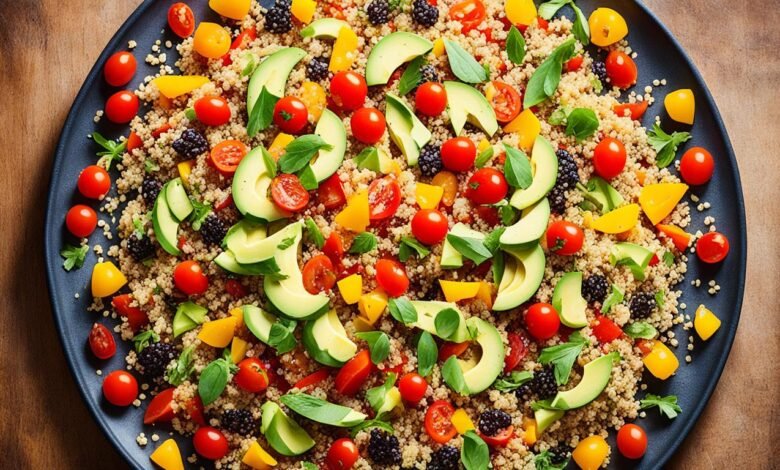
Not all carbs are bad. Many high carb foods are healthy, offering vital nutrients and energy. They are different from processed or refined carbs, which can be harmful. Let’s look at several healthy high carb options for your diet.
Quinoa – A Nutrient-Dense Pseudocereal
Quinoa is loved for being both tasty and super healthy. It’s actually a seed, not a true cereal, though it’s eaten like one. When cooked, it’s mostly carbs but is also high in protein and fiber.
This pseudocereal is packed with minerals and plant compounds. These are known to boost your health in many ways. It’s especially great for digestion and keeping you feeling full.
A cup of cooked quinoa has about 8 grams of protein. This is key for vegetarians or anyone limiting their diet. Its protein quality is similar to that from milk, which is quite impressive.
Quinoa also offers minerals like magnesium and phosphorus. These keep our bones strong and our nerves working smoothly. They’re even crucial for turning food into energy.
This seed also contains flavonoids and antioxidants. They are good for managing blood sugar and fighting off diseases. So, quinoa does more than just fill you up.
Quinoa is free from gluten, perfect for those who can’t have it. You can eat it by itself, mix it in salads or soups, or use it as a rice or pasta replacement. It’s versatile and a great fit for many meals.
Next, let’s dive into oats, another grain that’s full of fiber.
Oats – A Fiber-Rich Whole Grain
Oats stand out as a top pick for a healthy, high-carb choice. They taste great and are full of nutrients that boost health.
Rolled oats are rich in fiber. This keeps our gut healthy and helps control sugar levels. A cup of cooked oats gives you 54 grams of carbs and 8 grams of fiber for lasting energy.
They also offer a good hit of protein. This supports building and fixing muscles, handy for those leading an active life.
What’s more, oats pack vitamins, minerals, and antioxidants. They’re especially good for iron, magnesium, zinc, and B vitamins, which keeps our bodies running well.
Adding oats to our daily meals can do wonders for our heart. The beta-glucan fiber they have works to cut down cholesterol and heart disease risk. So, a bowl of oats can keep your heart in good shape.
Let’s take a closer look at the nutrients in a cup of cooked oats:
| Nutrient | Amount |
|---|---|
| Carbohydrates | 54 grams |
| Fiber | 8 grams |
| Protein | 6 grams |
| Fat | 2 grams |
| Iron | 20% of your daily value |
| Magnesium | 37% of your daily value |
| Zinc | 20% of your daily value |
| Vitamin B6 | 10% of your daily value |
Oats are great for weight management and a healthy life. You can enjoy them in many ways. Try overnight oats, oatmeal cookies, or blend them into smoothies for extra goodness.
When picking oats, go for whole grain kinds. They include the entire oat grain. So, you get more fiber and nutrients this way.
Try this delicious recipe: Oatmeal with Fresh Berries
- 1 cup of cooked oats
- 1/2 cup of mixed fresh berries (strawberries, blueberries, raspberries)
- 1 tablespoon of honey or maple syrup
- A sprinkle of cinnamon
- Cook the oats as the package says.
- Top with fresh berries.
- Drizzle with honey or maple syrup.
- Sprinkle some cinnamon for flavor.
Start your day right with this healthy and tasty meal. It will give you the energy you need.
Buckwheat – A Gluten-Free Pseudocereal
Buckwheat is at the top of the list for gluten-free, nutritious grains. It adds great value to any meal plan, with abundant health advantages. It carries 75 grams of carbs in its unprocessed state, offering a lasting energy supply. Also, it’s rich in dietary fiber, which supports a healthy digestion.
This grain-like seed is rich in minerals and antioxidants, making it incredibly beneficial. Its strong antioxidant content fights against stress and inflammation. This helps in maintaining a healthy heart and lowers the risk of diseases.
If you’re avoiding gluten or want to mix up your meals, choose buckwheat. It fits well in many dishes, like salads or porridges. Its interesting nutty taste enhances any food, delighting keen cooks.
Benefits of Buckwheat:
- Gluten-free alternative for those with celiac disease or gluten intolerance.
- Rich in antioxidants that support heart health and reduce the risk of chronic diseases.
- Good source of dietary fiber, promoting healthy digestion and gut health.
- Nutrient-dense with essential minerals for overall well-being.
Invite the advantages of buckwheat into your life through its flavors and health perks. It can upgrade your usual dishes or lead to exciting new meals. Your wellbeing and palate will both benefit!
Bananas – A Nutrient-Rich Fruit
Bananas are loved for being both tasty and healthy. They are packed with essential nutrients. These nutrients support your body in many ways.

Nutritional Values
A medium banana has around 31 grams of carbs. This includes starches and sugars. Bananas are a great energy source for your body.
They are also full of potassium, boasting 400-450 milligrams. Potassium is key for a healthy heart and normal blood pressure.
Bananas offer a good dose of vitamins too. This includes B6, which aids in brain and nerve health. Vitamin C helps your immune system and keeps your skin looking good.
They are also loaded with plant compounds known as flavonoids and catechins. These act as antioxidants, protecting your cells from damage. This helps keep your whole body healthier.
Resistant Starch and Digestive Health
Bananas have something unique – resistant starch. This type of carb isn’t fully digested in the small intestine. Instead, it feeds good bacteria in the intestines.
This process helps your gut by promoting healthy bacteria. It also aids in keeping your digestive system working well. The result is better digestion and bowel health.
| Nutrient | Amount per Medium Banana |
|---|---|
| Carbohydrates | 31 grams |
| Potassium | 400-450 milligrams |
| Vitamin B6 | 0.4 milligrams |
| Vitamin C | 8.7 milligrams |
Overall, bananas are both delicious and nutritious. They are rich in potassium, vitamins B6 and C, and beneficial plant compounds. Their resistant starch helps your digestion too.
Sweet Potatoes – A Nutrient-Dense Tubar
Sweet potatoes are both yummy and good for you. They’re a top choice in the high carb veggie category. Adding sweet potatoes to your meals makes them richer and adds a lot of health benefits. Just half a cup of cooked, mashed sweet potatoes has 20.7 grams of carbs. This makes them a great energy source for your body.
One key thing about sweet potatoes is they’re packed with good stuff. They’ve got lots of vitamins and minerals that are super important for your health. Two vitamins you get a lot of from sweet potatoes are A and C. These vitamins help your immune system and keep your skin healthy.
The bright orange color of sweet potatoes shows they’re full of beta-carotene. This is turned into vitamin A in your body. Beta-carotene works as an antioxidant that fights off cell damage from free radicals. It also keeps your eyes in good shape.
Sweet potatoes also give you potassium, which keeps your blood pressure in check. They have minerals like manganese that help your bones and handle carbs. This makes sweet potatoes really good for your heart and overall health.
Eating sweet potatoes is smart because they’re packed with antioxidants. Antioxidants lower inflammation and fight off stress in your body. This stress can lead to serious diseases, like heart problems and some kinds of cancer.
Roasting sweet potatoes is a delicious way to eat them. You can make a great side or snack by adding a bit of olive oil, herbs or spices, and salt. Or you could use sweet potatoes in soups, stews, salads, or make fries from them.
Check out the table below for more info on the nutrients in sweet potatoes:
| Nutrient | Amount per 100g |
|---|---|
| Carbohydrates | 20.1g |
| Calories | 86 |
| Fiber | 3.0g |
| Vitamin A | 961µg |
| Vitamin C | 22.2mg |
| Potassium | 337mg |

Beets – A Colorful Root Vegetable
Beets are a vibrant purple root vegetable. They are high in carbohydrates, coming mainly from sugars and dietary fiber. This makes them a great part of a balanced diet.
Beets provide energy and are packed with essential vitamins and minerals. They offer antioxidants that protect against free radicals. These antioxidants, including betalains, have been tied to health benefits like reducing inflammation.
Beets are famous for their high nitrate content. The body turns this into nitric oxide, which can boost heart health by helping blood pressure and improving blood flow.
Adding beets to your diet can be good for your heart. It might also improve how well you perform physically. Research shows that beet juice, with its high nitrate level, can boost endurance and performance.
There are many ways to enjoy beets. You can add them to salads, roast them as a side dish, or blend them into juices. Beets add color and a yummy earthy taste to your meals. Try out different recipes to include beets in your diet and enjoy their health perks.
Nutritional Profile of Beets
| Nutrient | Amount per 100g |
|---|---|
| Carbohydrates | 9.6g |
| Fiber | 2.8g |
| Protein | 1.6g |
| Fat | 0.2g |
| Vitamin C | 4.9mg |
| Folate | 109μg |
| Potassium | 305mg |
| Nitrates | 110mg |
Conclusion
Including high-carb foods in your meals can be a healthy choice. Pick nutrient-rich options like quinoa, oats, buckwheat, bananas, sweet potatoes, and other fruits and veggies. This way, you get the good parts of carbs and lots of essential nutrients.
These foods are a good source of energy and fit well in a balanced diet. Keep in mind, not every carb is the same. Choose healthy carbs for the nutrients they provide.
Eating a mix of high-carb foods and others helps keep your diet balanced. It’s a recipe for good health. Incorporate these choices into your meals. This will make your food more interesting and ensure your body gets the nutrients it needs.




